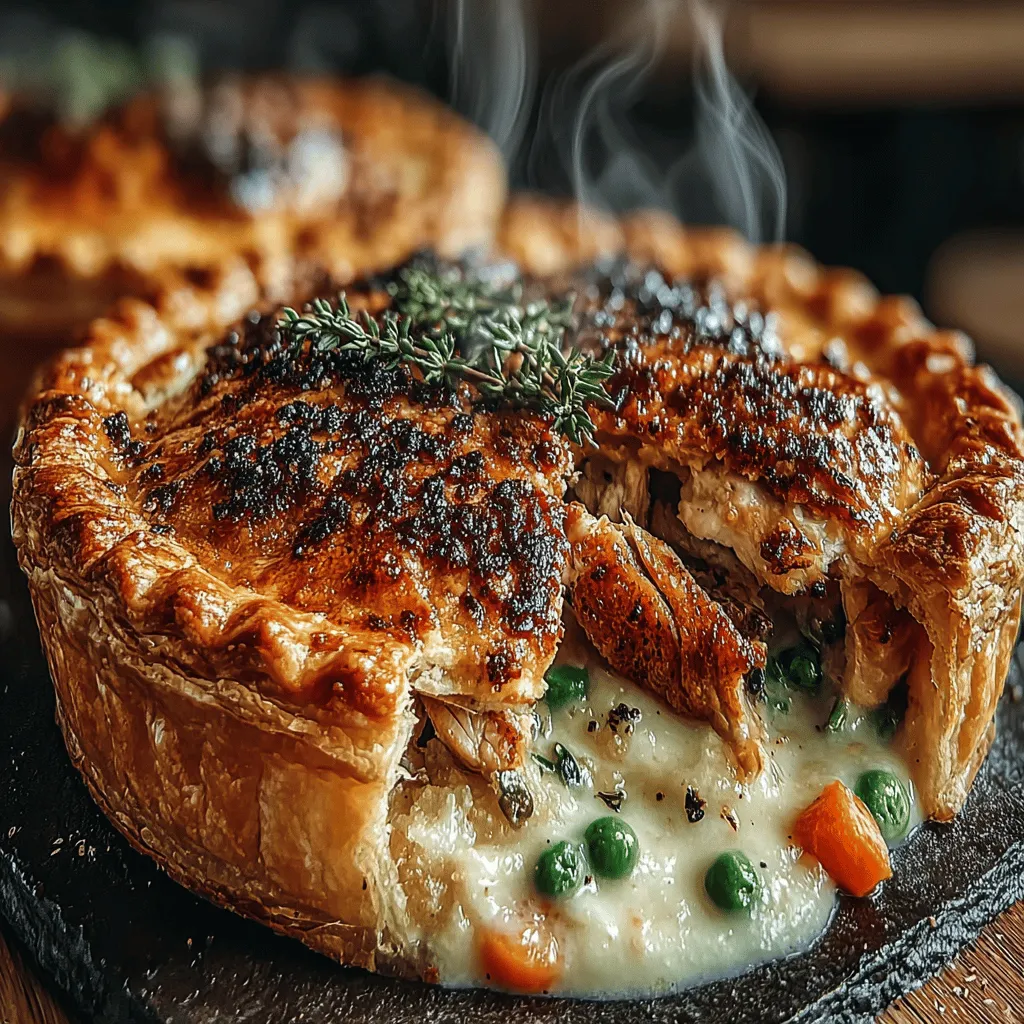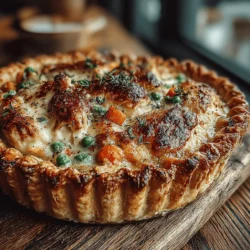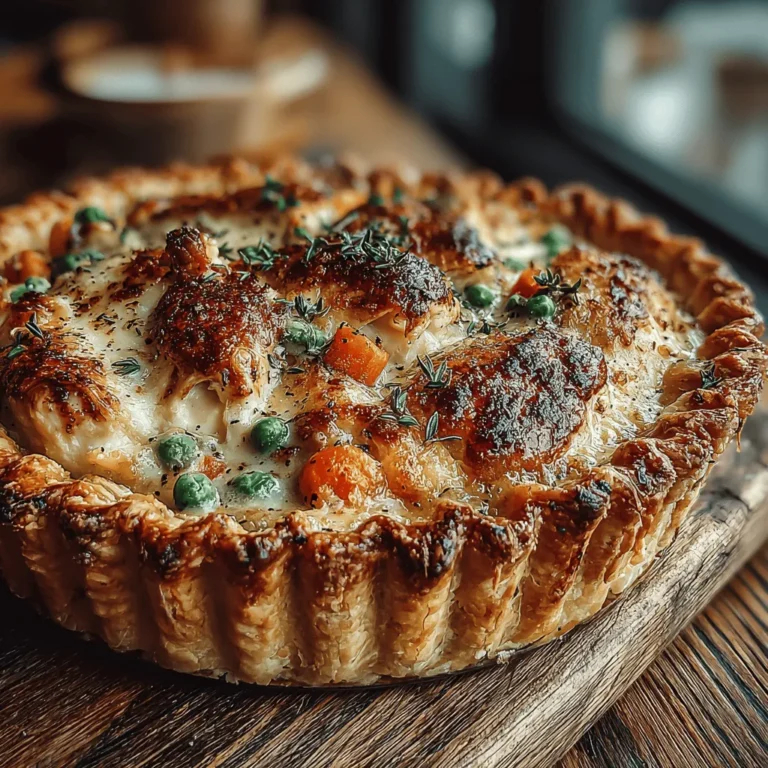Chicken pot pie is a beloved classic that evokes feelings of warmth and nostalgia. This comforting dish combines tender chicken, flavorful vegetables, and a creamy sauce, all encased in a flaky pastry crust. While many enjoy the convenience of store-bought versions, nothing quite compares to the homemade variety, where you can tailor the flavors and freshness to your liking. In this recipe, you’ll learn how to create a perfectly flaky crust and a savory filling that will delight your taste buds and warm your soul.
Ingredients
– 2 cups boneless, skinless chicken thighs, diced
– 1 cup carrots, diced
– 1 cup celery, diced
– 1 cup frozen peas
– 1 medium onion, chopped
– 2 cloves garlic, minced
– 1/2 cup chicken broth
– 1 cup heavy cream
– 1/4 cup all-purpose flour
– 1 teaspoon dried thyme
– 1 teaspoon dried rosemary
– Salt and pepper to taste
– 1 recipe for pie crust (homemade or store-bought)
– 1 tablespoon olive oil or butter for sautéing
Instructions
1. Preheat your oven to 425°F (220°C).
2. In a large skillet, heat olive oil or butter over medium heat. Add the diced chicken and cook until browned and cooked through, about 5-7 minutes. Remove from the skillet and set aside.
3. In the same skillet, add the chopped onion, carrots, and celery. Sauté for about 5 minutes until the vegetables are softened.
4. Add the minced garlic and cook for an additional minute until fragrant.
5. Sprinkle the flour over the sautéed vegetables and stir to combine. Cook for 1-2 minutes to eliminate the raw flour taste.
6. Gradually pour in the chicken broth and heavy cream, stirring continuously until the mixture thickens, about 3-5 minutes.
7. Add the cooked chicken back to the skillet along with the frozen peas, thyme, rosemary, salt, and pepper. Mix well to combine and remove from heat.
8. Roll out the pie crust and fit it into a pie dish. Pour the chicken filling into the prepared crust.
9. Cover with a second layer of pie crust, sealing the edges. Cut a few slits in the top to allow steam to escape.
10. Bake in the preheated oven for 25-30 minutes or until the crust is golden brown and the filling is bubbling.
Understanding Chicken Pot Pie
Chicken pot pie has a rich history in American cuisine, often associated with home-cooked meals and family gatherings. Its origins can be traced back to medieval Europe, where similar meat-filled pies were common. Over time, the dish has evolved, with variations appearing around the globe. For instance, in the UK, chicken pot pie often features a thicker gravy and is served with mashed potatoes.
Nutritionally, this dish offers a balanced combination of protein from the chicken, vitamins from the vegetables, and carbohydrates from the crust. The use of fresh ingredients not only enhances the flavor but also contributes to a well-rounded meal.
Ingredients Breakdown
The filling of chicken pot pie is crucial for achieving that comforting flavor. Using boneless, skinless chicken thighs instead of breasts ensures that the meat remains tender and juicy. The inclusion of vegetables like carrots, celery, and peas not only adds color but also essential nutrients. Each vegetable plays a unique role in enhancing the overall taste and texture of the filling.
The crust is equally important. A combination of all-purpose flour and butter creates that desired flakiness. Chilling the butter and using ice water are essential techniques to prevent the butter from melting too quickly, which helps achieve a light, flaky crust.
Preparing the Chicken Filling
To create the perfect chicken filling, start by cooking the chicken thoroughly to develop a rich flavor. Browning the chicken adds depth to the dish. When sautéing the vegetables, aim for a balance of tenderness while maintaining some texture; this will ensure that each bite is satisfying. Aromatics like onion and garlic are key to building a robust flavor foundation.
For the creamy filling, the thickening process is essential. The flour adds body, while the cream balances the flavors, creating a luscious sauce that coats the chicken and vegetables beautifully. Incorporating herbs will elevate the dish, giving it a fragrant aroma and a touch of sophistication.

Crafting the Flaky Crust
Essential Techniques for Making Pie Crust from Scratch
To create a truly flaky pie crust, start with high-quality ingredients: all-purpose flour, cold unsalted butter, and ice-cold water. Use a pastry cutter or your fingertips to work the butter into the flour until the mixture resembles coarse crumbs. This method ensures that small pieces of butter remain intact, which will create steam during baking and lead to a flaky texture.
The Science Behind Using Cold Ingredients and Minimal Handling
Keeping your ingredients cold is crucial. When butter is cold, it retains its shape longer during mixing, which contributes to flakiness. Additionally, handling the dough as little as possible prevents the development of gluten, which can make the crust tough. Aim for a light touch and work quickly to maintain that chill.
Tips for Rolling Out Dough and Ensuring Even Thickness
When rolling out your dough, start by lightly flouring your surface and the rolling pin to prevent sticking. Roll from the center outward, applying even pressure to achieve a uniform thickness. If you notice the dough starting to stick, sprinkle a little more flour as needed. For a perfect fit in your pie dish, make sure to roll the dough slightly larger than the pan.
Importance of Resting the Dough Before Rolling
Letting the dough rest in the refrigerator for at least 30 minutes is essential. This resting period allows the gluten to relax, making the dough easier to roll out and preventing shrinkage during baking. Wrap the dough in plastic wrap to keep it cold and prevent it from drying out.
Assembling the Pot Pie
Detailed Instructions for Layering Filling and Crust
Begin by pre-cooking your filling to ensure all ingredients are tender and flavorful. Once your filling is ready, pour it into the pie crust, leaving some space at the top. Carefully lay your top crust over the filling, ensuring it covers the edges completely.
Techniques for Sealing the Edges and Preventing Leaks
To seal the edges, gently press the top and bottom crusts together using your fingers or a fork. This creates a tight seal that prevents the filling from bubbling over. For added security, brush the edges with a little egg wash, which not only helps seal but also gives a beautiful golden color when baked.
Creative Ideas for Customizing the Top Crust with Decorative Slits or Shapes
Get creative with your top crust! Use a sharp knife to cut slits for steam vents, or use cookie cutters to create decorative shapes from excess dough. These not only enhance the appearance but also allow steam to escape, preventing your pot pie from becoming soggy.
Baking the Pot Pie
Guidelines for Preheating the Oven and Baking Times
Preheat your oven to 425°F (220°C) before placing your pot pie inside. Baking at a high temperature initially helps the crust become golden and crispy. Bake for about 30 to 40 minutes, or until the crust is golden brown and the filling is bubbling.
What to Look for in Terms of Crust Color and Bubbling Filling
Keep an eye on the pie as it bakes. The crust should turn a rich golden brown, and you should see the filling bubbling through the vents. If the edges brown too quickly, cover them with strips of aluminum foil to prevent burning.
Cooling and Setting: Why It’s Essential to Let the Pie Rest Before Serving
Once baked, allow your chicken pot pie to cool for at least 15 minutes before serving. This resting period allows the filling to set, making it easier to cut and serve. Cutting into the pie too early can result in a soupy filling.
Presentation and Serving Suggestions
Ideas for Serving Chicken Pot Pie: In the Dish or as Individual Portions
For a cozy family dinner, serve the pot pie straight from the dish. Alternatively, consider portioning it into individual ramekins for a more elegant presentation, perfect for a dinner party or special occasion.
Suggestions for Garnishing and Enhancing Visual Appeal
Add a touch of freshness and color by garnishing with chopped parsley or thyme just before serving. This not only enhances the visual appeal but also adds a burst of flavor that complements the dish.
The Use of Fresh Herbs for Added Flavor and Decoration
Incorporating fresh herbs into your pot pie filling or as a garnish elevates the dish. Consider adding rosemary, thyme, or sage to your filling for an aromatic touch that enhances the comforting flavors of chicken pot pie.
Conclusion
Homemade chicken pot pie is the epitome of comfort food, offering a warm, satisfying meal that brings people together. This recipe not only provides a hearty dish for family dinners but also serves as an excellent option for special occasions. Embrace the joy of cooking and share this delightful creation with your loved ones, making cherished memories around the table. With practice, making your own pot pie can become a beloved tradition in your kitchen.


